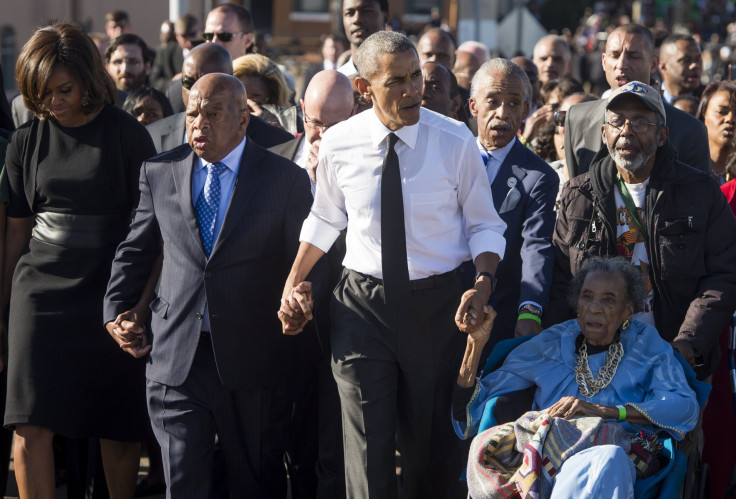Barack Obama: Civil Rights Activist Amelia Boynton Robinson Was A 'Dedicated And Courageous Leader'

Amelia Boynton Robinson, the late Alabama civil rights activist who helped mobilize the marches in Selma for historic voting rights legislation, was memorialized by U.S. President Barack Obama Wednesday, following the news of her passing. Obama remembered Boynton Robinson, who died at age 104, as “a dedicated and courageous leader” of the civil rights movement.
“For most of her 104 years, Amelia committed herself to a simple, American principle: that everybody deserves the right to vote,” Obama said in a statement about the late activist who was one of many marchers beaten on a bridge in Selma in 1965, before passage of the landmark Voting Rights Act. “To honor the legacy of an American hero like Amelia Boynton requires only that we follow her example -- that all of us fight to protect everyone’s right to vote,” Obama said in the statement.
Boynton Robinson is credited as the organizer who asked the Rev. Martin Luther King Jr. to come to Selma in 1965 and help local activists defeat barriers that kept many African-Americans from voting, the Montgomery Advertiser reported. She made history a year earlier as the first black person to run for U.S. Congress in Alabama. Boynton Robinson continued her voting rights advocacy throughout her life and was portrayed in “Selma,” a 2015 film about the events leading up to the civil rights marches.
Daughter Germaine Bowser confirmed to an Alabama public radio station that her mother passed away early Wednesday morning, according to a National Public Radio report. She had suffered several strokes this summer and was hospitalized, Bowser said.
In March, Boynton Robinson joined Obama and fellow Selma marcher U.S. Rep. John Lewis of Georgia for the 50th anniversary commemorative march across the Edmund Pettus Bridge. Obama called it an “honor” to walk with the late activists and other foot soldiers of the civil rights movement.
“She was as strong, as hopeful, and as indomitable of spirit -- as quintessentially American -- as I’m sure she was that day 50 years ago,” Obama said in the statement. “And we offer our thoughts, our prayers, and our enduring gratitude to everyone who loved her.”
President mourns 104-y/o cvil rights hero Amelia Boynton Robinson. Injured in Selma 50 yrs ago & there w/him recently pic.twitter.com/sddFxTQa5M
— West Wing Reports (@WestWingReport) August 26, 2015
Other African-American leaders issued remembrances Wednesday.
“Often referred to as the matriarch of our country’s Civil Rights Movement, Mrs. Boynton Robinson worked tirelessly on the behalf of those who were discriminated against and disenfranchised, and she stood courageously in the fight to ensure voting rights for every citizen in this nation,” read a statement from the Congressional Black Caucus, which includes Lewis as a member.
The Rev. Al Sharpton of the National Action Network said in a statement that lawmakers must honor her legacy.
“One of my greatest moments of pride was walking behind her wheelchair on the bridge in March next to President Barack Obama on the 50th Anniversary of the day that she and Congressman John Lewis were beaten,” he said. “I am glad she lived to see a black President, but we must make sure we maintain the Voting Rights Act and voter protection for all Americans in her memory.”
© Copyright IBTimes 2024. All rights reserved.












